 “Well, that happened!”–Donald Trump impersonator Alec Baldwin, as a car wreck-causing actor in State and Main (2000).
“Well, that happened!”–Donald Trump impersonator Alec Baldwin, as a car wreck-causing actor in State and Main (2000).
Well, that happened. But as we worry about any future damage that the president-elect and co-star of Home Alone 2 and Ghosts Can’t Do It may cause, let’s pause right now to give thanks to some of our favorites this holiday season.
Thank you…
Casey Affleck, for hurting so good in Manchester by the Sea. “I can’t beat it” is an agonizing movie moment, and a cathartic one, too. Rivaling next week’s Jackie as the grief fest of the season, the latest from Kenneth Lonergan (You Can Count on Me, Margaret) seethes with personal trauma that the movie, which radiates outwards from his held-in pain, can barely contain. Yet it’s not a drag to experience. We feel your pain.
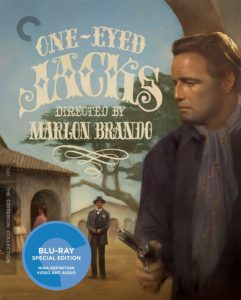 Barnes & Noble, for the month-long Black Friday known as the Criterion Collection 50% Off Sale, held twice per year. What to buy this time? How about a trio of Robert Altman classics–McCabe and Mrs. Miller (with music by the late Leonard Cohen), The Player, and Short Cuts? Les Blank’s long-unseen portrait of the late Leon Russell (this year), A Poem is a Naked Person? The tricky German puzzler, Phoenix, an arthouse hit last year? Orson Welles’ great Shakespeare adaptation Chimes at Midnight, finally available in watchable form, with loads of supplements of course? If I had to pick one, however, it would be Marlon Brando’s lone effort as director, 1961’s One-Eyed Jacks. Difficult to see in anything close to pristine form for decades (the widescreen laserdisc, which I have in storage somewhere, was the basis of many public domain rip jobs), this extraordinary Western, the last film shot in screen-filling VistaVision, has been given a 4k makeover supervised by Steven Spielberg and Martin Scorsese, and it looks fantastic. The supplements, including voice recordings from the star and director, go into its complex shoot on location in striking Monterey, CA (Brando took over from Stanley Kubrick, and embarked on the task with a Kubrickian eye for detail, like the precise patterning of waves as horses rode by a beach)–but the stories in no way overshadow the story being told. The brooding, and broodingly romantic, tale of a thief (Brando, looking great in border wear) who wreaks an insinuating vengeance on a traitorous confederate (Karl Malden, never better than in his films with Brando) is rich with lies, deceit, and double crosses, and great turns for character actors like Slim Pickens, Timothy Carey, and Ben Johnson. Johnson plays “Bob,” and Brando’s pronunciation of my name is a small pleasure in a movie abounding with larger ones. A great restoration of a great, and still unsung, film, one of Brando’s handful of memorable credits in his wilderness years in the 60s.
Barnes & Noble, for the month-long Black Friday known as the Criterion Collection 50% Off Sale, held twice per year. What to buy this time? How about a trio of Robert Altman classics–McCabe and Mrs. Miller (with music by the late Leonard Cohen), The Player, and Short Cuts? Les Blank’s long-unseen portrait of the late Leon Russell (this year), A Poem is a Naked Person? The tricky German puzzler, Phoenix, an arthouse hit last year? Orson Welles’ great Shakespeare adaptation Chimes at Midnight, finally available in watchable form, with loads of supplements of course? If I had to pick one, however, it would be Marlon Brando’s lone effort as director, 1961’s One-Eyed Jacks. Difficult to see in anything close to pristine form for decades (the widescreen laserdisc, which I have in storage somewhere, was the basis of many public domain rip jobs), this extraordinary Western, the last film shot in screen-filling VistaVision, has been given a 4k makeover supervised by Steven Spielberg and Martin Scorsese, and it looks fantastic. The supplements, including voice recordings from the star and director, go into its complex shoot on location in striking Monterey, CA (Brando took over from Stanley Kubrick, and embarked on the task with a Kubrickian eye for detail, like the precise patterning of waves as horses rode by a beach)–but the stories in no way overshadow the story being told. The brooding, and broodingly romantic, tale of a thief (Brando, looking great in border wear) who wreaks an insinuating vengeance on a traitorous confederate (Karl Malden, never better than in his films with Brando) is rich with lies, deceit, and double crosses, and great turns for character actors like Slim Pickens, Timothy Carey, and Ben Johnson. Johnson plays “Bob,” and Brando’s pronunciation of my name is a small pleasure in a movie abounding with larger ones. A great restoration of a great, and still unsung, film, one of Brando’s handful of memorable credits in his wilderness years in the 60s.
Warren Beatty, who hasn’t directed a movie since 1998’s prescient Bulworth, who hasn’t acted in a movie since 2001’s Town and Country, for directing, acting, and wearing other hats on Rules Don’t Apply, in which he quite aptly plays the reclusive Howard Hughes. It’s a quirky comeback, a fanciful portrait of Hughes in his gilded decline in late 50s LA wrapped around a rom-com-ish love story involving chaste ingenue Lily Collins and budding real estate mogul Alden Ehrenreich, who are pulled haplessly into the billionaire’s orbit. Like Ang Lee’s stillborn experiment Billy Lynn’s Long Halftime Walk, I suspect that where boxoffice is concerned this will be another small folly, a nail in the coffin for Hollywood auteurism. But it’s sort of glorious anyway, beautifully, modestly crafted (no fiscal overindulgence here), lightly sweet and funny in places, and just plain offbeat, in a way that aging film buffs (and I suspect aging film buffs only) will relate to. Somehow Beatty has pulled off 55 years of stardom, with lengthy gaps between projects, by marching to his own drum, and the music continues. With supporting roles for Annette Bening, as Collins’ disapproving mother, and Matthew Broderick and Candice Bergen as Hughes’ loyal assistants, and tiny ones for Paul Sorvino, Ed Harris, and Amy Madigan.
Bleed for This, for giving Miles Teller, Aaron Eckhart, and especially Ciaran Hinds (as Teller’s father) the chance to put on funny wigs, clothes, and accents in the true story of boxer Vinny Paz’s recovery from spine-threatening injuries, all to fight and risk it all over again. It’s not a comedy, but it is closer to The Fighter than to Creed, and it’s amusing to watch the buffed-up Teller and just-plain-flabby Eckhart work the added pounds.
 Jessica Chastain, for spiking the Michael Clayton-ish Miss Sloane with her tightest, most hemmed-in performance since Zero Dark Thirty. The film doesn’t follow suit. (It boils down to two twists, one that advances the story, about a super-lobbyist’s campaign against the gun lobby, and one that’s merely incredible.) If you’re missing the weekly political intrigue of The Good Wife, however, here it is, in capsule form, complete with a small role for Christine Baranski.
Jessica Chastain, for spiking the Michael Clayton-ish Miss Sloane with her tightest, most hemmed-in performance since Zero Dark Thirty. The film doesn’t follow suit. (It boils down to two twists, one that advances the story, about a super-lobbyist’s campaign against the gun lobby, and one that’s merely incredible.) If you’re missing the weekly political intrigue of The Good Wife, however, here it is, in capsule form, complete with a small role for Christine Baranski.
Crazy Asian martial arts movies, which always give me a lift. Well Go Entertainment is the best provider of these, going the extra mile to put them out on Blu-ray with a few extras. The action this month is on DVD, where Crouching Tiger, Hidden Dragon star Michelle Yeoh headlines the John Woo-produced Reign of Assassins (2010), as an assassin involved in a star-crossed love affair soaked in tears and bloodshed. Two stars of the forthcoming Rogue One, Donnie Yen and Wen Jiang, play a warrior and a general enmeshed in “three kingdoms” intrigue in The Lost Bladesman (2011). And meet Judge Archer (2012), who settles disputes among martial arts schools with his superior archery skills, but has some issues of his own and two lethal ladies to contend with. Better late than never with these releases, all hitting that particular sweet spot.
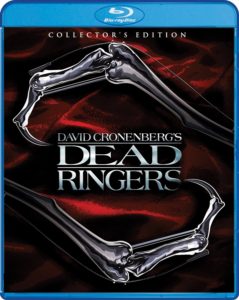 David Cronenberg, represented by two new Scream Factory releases, Rabid (1977) and Dead Ringers (1988). Rabid, his second attempt at “body horror,” features porn star Marilyn Chambers in a sympathetic performance as a surgical patient afflicted by a bloodthirsty penile parasite, which bursts from her armpit and infects victim after victim. It’s a provocative if rather crude entry in a self-styled genre that Cronenberg would begin to perfect with The Brood (which you can pick up at the Criterion sale). Dead Ringers remains his masterpiece, the film he’d been working toward, with Jeremy Irons in a spectacular (and sadly unrewarded) performance as twin gynecologists, unbalanced by love, spiraling downwards in addiction. While Cronenberg has made some good films since (I may be alone in admiring Cosmopolis) and remains on nodding aquaintance with his earlier themes, he’s never made one better–a truly great film, one best prepared for by revisiting all the films that led up to it. But the two Blu-ray transfers available, while improving on Criterion’s earlier DVD, are visually inconsistent, and show their age. There is, however, a consoling mix of supplements, old (Irons commentary) and new (DP, special effects, and co-star interviews, and a commentary by Cronenberg scholar Willian Beard). Rabid, however, looks as good as a low-budget Canadian film from 40 years ago can look, and retains a prior Cronenberg commentary and more archival material while adding poignant interviews about Chambers.
David Cronenberg, represented by two new Scream Factory releases, Rabid (1977) and Dead Ringers (1988). Rabid, his second attempt at “body horror,” features porn star Marilyn Chambers in a sympathetic performance as a surgical patient afflicted by a bloodthirsty penile parasite, which bursts from her armpit and infects victim after victim. It’s a provocative if rather crude entry in a self-styled genre that Cronenberg would begin to perfect with The Brood (which you can pick up at the Criterion sale). Dead Ringers remains his masterpiece, the film he’d been working toward, with Jeremy Irons in a spectacular (and sadly unrewarded) performance as twin gynecologists, unbalanced by love, spiraling downwards in addiction. While Cronenberg has made some good films since (I may be alone in admiring Cosmopolis) and remains on nodding aquaintance with his earlier themes, he’s never made one better–a truly great film, one best prepared for by revisiting all the films that led up to it. But the two Blu-ray transfers available, while improving on Criterion’s earlier DVD, are visually inconsistent, and show their age. There is, however, a consoling mix of supplements, old (Irons commentary) and new (DP, special effects, and co-star interviews, and a commentary by Cronenberg scholar Willian Beard). Rabid, however, looks as good as a low-budget Canadian film from 40 years ago can look, and retains a prior Cronenberg commentary and more archival material while adding poignant interviews about Chambers.
The Edge of Seventeen returns the teen movie to mundane concerns hijacked by “young adult” adaptations overrun with vampires, aliens, and authoritarian governments. It’s refreshing to have it back, as writer-director Kelly Fremon Craig puts the put-upon Nadine (Hailee Steinfeld, sassily grown up since True Grit) through the paces–a best friend who’s fallen for her cooler older brother, an uncomprehending mom (Kyra Sedgwick), and unprocessed grief over the death of her father. There’s also a wary guardian angel in a dozy English teacher (Woody Harrelson, underplaying quite excellently) and boy trouble–Craig updates the “Long Duk Dong” stereotype of Sixteen Candles (1984) by making the Asian suitor, an awkward film nerd, the more desirable catch (Hayden Szeto has a way better bod than any awkward film nerd I’ve ever met, but having an Asian suitor is itself an advance.) James L. Brooks is a producer, and Craig’s script has that attitude and structure, too–few histrionics, little actions and gestures that speak volumes, believable shortcuts to hard truths. If only it had been released in summer, when its primary audience was out of school; well, they’ll find it elsewhere.
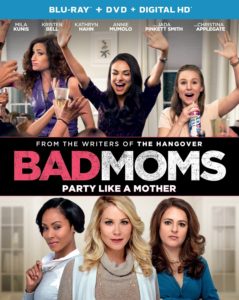 Kathryn Hahn I fell in love with in the Broadway revival of the comedy Boeing-Boeing (2008), which sent her and Mark Rylance on their way to stardom. Hahn has worked steadily since, brightening everything from Captain Fantastic to Tomorrowland, and bringing stunning contours to her role as an emotionally buffeted rabbi on Amazon’s terrific Transparent. Creator Jill Soloway’s feature Afternoon Delight, where she plays a bored LA housewife who invites a stripper to room with her family, is another Hahn highlight. From the guys who brought you The Hangover, the summer hit Bad Moms is the blunter, “adult comedy” version of that, with gross-out gags and obvious statements about parenting substituting for Soloway’s wit and nuance. Mila Kunis and Kristen Bell, the stars, do what they can do with it. But Hahn, the instigator of the rebellion, throws herself into the thing, wringing laughs and what passes for credibility in her no holds barred liberation from stay-at-home norms. She’s a wonder, and I’ll happily put up with a sequel or two.
Kathryn Hahn I fell in love with in the Broadway revival of the comedy Boeing-Boeing (2008), which sent her and Mark Rylance on their way to stardom. Hahn has worked steadily since, brightening everything from Captain Fantastic to Tomorrowland, and bringing stunning contours to her role as an emotionally buffeted rabbi on Amazon’s terrific Transparent. Creator Jill Soloway’s feature Afternoon Delight, where she plays a bored LA housewife who invites a stripper to room with her family, is another Hahn highlight. From the guys who brought you The Hangover, the summer hit Bad Moms is the blunter, “adult comedy” version of that, with gross-out gags and obvious statements about parenting substituting for Soloway’s wit and nuance. Mila Kunis and Kristen Bell, the stars, do what they can do with it. But Hahn, the instigator of the rebellion, throws herself into the thing, wringing laughs and what passes for credibility in her no holds barred liberation from stay-at-home norms. She’s a wonder, and I’ll happily put up with a sequel or two.
Hell or High Water, one of the year’s better movies, bowed on home video yesterday. It gains on rewatching, and there are some decent supplements, including a discussion with director David Mackenzie (easily his best film) and the principal actors, plus conversation about the characterizations with screenwriter Taylor Sheridan. Fight it out with your relatives about the president-elect, then sit down for this thoughtful “red state” entertainment and let the healing begin.
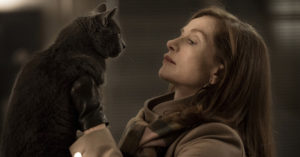 Isabelle Huppert and Paul Verhoeven finally collaborated, on one “Elle” of a movie. The director’s first film in a decade is a perverse delight, which begins with Huppert’s character, a purveyor of violent video games, being sexually assaulted in her home. Her response to the shattering event is nonchalant, completely casual, for reasons that only become known as the story progresses, agglomerating weird backstories and an assortment of oddballs similar to the ones who inhabit the (Pedro) Almodovar-se. It’s kind of a thriller (with one great “jump scare.” as my son calls them), kind of a black comedy (LOL funny at times, usually inappropriate), kind of a commentary on rape culture and mass media interest in lurid violence–and above all a study of Huppert’s inscrutable face. She kills with a single expression, and levels all of Paris with the thinnest of smiles. There’s never been anyone like Isabelle Huppert, and this is a wonderful showcase for her, from a director who loves to tip sacred cows.
Isabelle Huppert and Paul Verhoeven finally collaborated, on one “Elle” of a movie. The director’s first film in a decade is a perverse delight, which begins with Huppert’s character, a purveyor of violent video games, being sexually assaulted in her home. Her response to the shattering event is nonchalant, completely casual, for reasons that only become known as the story progresses, agglomerating weird backstories and an assortment of oddballs similar to the ones who inhabit the (Pedro) Almodovar-se. It’s kind of a thriller (with one great “jump scare.” as my son calls them), kind of a black comedy (LOL funny at times, usually inappropriate), kind of a commentary on rape culture and mass media interest in lurid violence–and above all a study of Huppert’s inscrutable face. She kills with a single expression, and levels all of Paris with the thinnest of smiles. There’s never been anyone like Isabelle Huppert, and this is a wonderful showcase for her, from a director who loves to tip sacred cows.
Kubo and the Two Strings, for being available on home video (including 3D Blu-ray, its optimum presentation) this week. The year’s best animated adventure, from the always vital Laika.
Mia Madre, from Italy’s Nanni Moretti, is ideal viewing for anyone with holiday jitters. Anxiety is a constant, as a film director (Margherita Buy) coping with the production crises squares off with her pompous American star (John Turturro) while tending to her dying mother (Giulia Lazzarini) and assorted family issues. Fiction bleeds into fact, as the movie shuttles between the set and the hospital, where different dramas are occurring. Turturro is there to lighten the load, but as with all of Moretti’s films there’s a sharply deployed element of play at work, so the film is off center and somehow buoyant despite the specter of death. (Leonard Cohen is again on the soundtrack.) Extras include a good amount of behind the scenes footage.
 Before there was The Magnificent Seven (1960), whose castmembers are now all gone with the death of Robert Vaughn, there was Akira Kurosawa’s The Seven Samurai (1954), which immortalized co-star Toshiro Mifune. With a new Magnificent Seven in theaters it’s appropriate that a documentary about the actor, Steven Okazaki’s Mifune: The Last Samurai, is in release this week. And it’s a good overview, with family members and colleagues, including Steven Spielberg (who directed him in 1941) having their say about a screen legend who was reservedly private and “Japanese,” but also volatile and explosively funny, a powderkeg of elements that made him an international favorite. Focusing on the trauma of World War II (Mifune, the son of Methodist missionaries, was raised in China) and his collaboration with Kurosawa amidst Japan’s changing film industry, the movie breezes over other elements of the actor’s life (which was tinged with scandal) yet conveys the electric shock of his work. Recommended.
Before there was The Magnificent Seven (1960), whose castmembers are now all gone with the death of Robert Vaughn, there was Akira Kurosawa’s The Seven Samurai (1954), which immortalized co-star Toshiro Mifune. With a new Magnificent Seven in theaters it’s appropriate that a documentary about the actor, Steven Okazaki’s Mifune: The Last Samurai, is in release this week. And it’s a good overview, with family members and colleagues, including Steven Spielberg (who directed him in 1941) having their say about a screen legend who was reservedly private and “Japanese,” but also volatile and explosively funny, a powderkeg of elements that made him an international favorite. Focusing on the trauma of World War II (Mifune, the son of Methodist missionaries, was raised in China) and his collaboration with Kurosawa amidst Japan’s changing film industry, the movie breezes over other elements of the actor’s life (which was tinged with scandal) yet conveys the electric shock of his work. Recommended.
Morris from America is a charmer, one that slipped in and out of theaters this summer but will find a more receptive audience at home. It’s a fish out of water comedy about the title character (Markees Christmas), a 13-year-old getting into the awkward situations that 13-year-olds do, except that he’s black, and marooned in Heidelberg, Germany, with his soccer coach father (Craig Armstrong). They’ve come for a fresh start, but have only found a deeper isolation. Music, and a flirtation with an older, more rebellious, girl, push Morris out of his understandable shell and into the culture at large. Nothing too unexpected happens but writer-director Chad Hartigan (This is Martin Bonner) has a good ear for dialogue and two excellent actors to put it and the situations across. The three participate in an audio commentary that enriches the production.
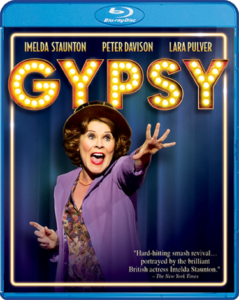 I love Broadway. And I love Blu-ray. So Shout Broadway, Shout Factory’s latest line, is right up my alley, and its first trio of releases should delight fans. Imelda Staunton’s performance as Mama Rose in last year’s West End production of Gypsy was the talk of the theater world, and here it is in all its meddling, crazily determined, showbizzy glory. Lacking co-stars of the caliber of Laura Benanti and Boyd Gaines I don’t think it equals the astonishing 2008 Broadway production, but Staunton (Vera Drake) gives the great Patti LuPone a run for her money. You can’t miss this rendition, which has been deftly filmed. But LuPone hasn’t been slighted. A San Francisco Symphony concert staging of Gypsy lyricist Stephen Sondheim’s Sweeney Todd: The Demon Barber of Fleet Street (2001) gives us a “taste” of her captivating Mrs. Lovett, later seen on Broadway, while preserving the essence of George Hearn’s performance in the title role and adding rising musical star Neil Patrick Harris into the mix. (The disc includes a making-of.) She and Kristin Chenoweth, meanwhile, share the Lincoln Center concert stage with other notables in a 2005 performance of Leonard Bernstein’s Candide, a grab bag of a show ideally suited for this type of recording. To paraphrase Sondheim, everything’s coming up roses for Shout Broadway.
I love Broadway. And I love Blu-ray. So Shout Broadway, Shout Factory’s latest line, is right up my alley, and its first trio of releases should delight fans. Imelda Staunton’s performance as Mama Rose in last year’s West End production of Gypsy was the talk of the theater world, and here it is in all its meddling, crazily determined, showbizzy glory. Lacking co-stars of the caliber of Laura Benanti and Boyd Gaines I don’t think it equals the astonishing 2008 Broadway production, but Staunton (Vera Drake) gives the great Patti LuPone a run for her money. You can’t miss this rendition, which has been deftly filmed. But LuPone hasn’t been slighted. A San Francisco Symphony concert staging of Gypsy lyricist Stephen Sondheim’s Sweeney Todd: The Demon Barber of Fleet Street (2001) gives us a “taste” of her captivating Mrs. Lovett, later seen on Broadway, while preserving the essence of George Hearn’s performance in the title role and adding rising musical star Neil Patrick Harris into the mix. (The disc includes a making-of.) She and Kristin Chenoweth, meanwhile, share the Lincoln Center concert stage with other notables in a 2005 performance of Leonard Bernstein’s Candide, a grab bag of a show ideally suited for this type of recording. To paraphrase Sondheim, everything’s coming up roses for Shout Broadway.
Thanks for all my favorite movies this difficult year, as we head toward toward what I can only hope will be a peaceful close.





Comments